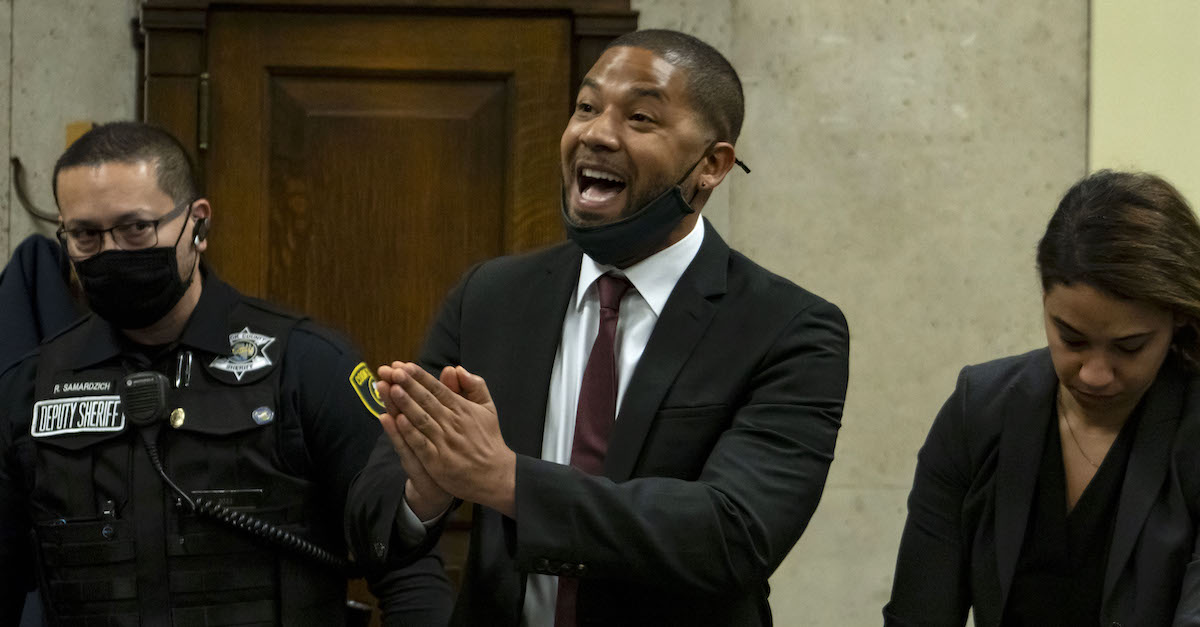
Actor Jussie Smollett speaks to Judge James Linn after his sentence was read on Thursday, March 10, 2022 at the Leighton Criminal Court Building. (Image via Brian Cassella/Pool/Chicago Tribune.)
The Illinois Supreme Court on Thursday dismissed the conviction of Jussie Smollett for allegedly lying about being the victim of a hate crime in 2019, reasoning that the prosecution violated the actor's due process rights. The ruling overturned the 42-year-old "Empire" actor's trial court conviction on five counts of disorderly conduct as well as an Illinois appellate court ruling that upheld the conviction.
The state's high court reasoned that because prosecutors in the Cook County State's Attorney's Office agreed to drop the charges against Smollett as part of a negotiated deal with his defense attorneys, the office could not bring the same charges against him a second time.
"Today we resolve a question about the State's responsibility to honor the agreements it makes with defendants," Justice Elizabeth M. Rochford wrote in a 32-page ruling. "Specifically, we address whether a dismissal of a case by nolle prosequi allows the State to bring a second prosecution when the dismissal was entered as part of an agreement with the defendant and the defendant has performed his part of the bargain. We hold that a second prosecution under these circumstances is a due process violation, and we therefore reverse defendant's conviction."
Smollett was accused of staging the 2019 hoax attack with the help of fellow actors Abel Osundairo and Ola Osundairo, two brothers who later said Smollett cut them a $3,500 check to attack him in furtherance of the scheme.
Cook County State's Attorney Kim Foxx controversially "nol-prossed" an initial felony case against the actor in exchange for community service and the forfeiting of his $10,000 bond. Former U.S. Attorney Dan Webb was later appointed as special counselor and decided to charge Smollett following an independent investigation.
Smollett was convicted on five of six disorderly conduct charges for allegedly lying to police and was subsequently sentenced to 150 days in jail, 30 months of probation, and a $130,000 fine. The sentence was subsequently stayed as Smollett's appeal played out.
The Illinois court's ruling twice referred to Bill Cosby's criminal case in Pennsylvania in which the court overturned the former American icon's sexual assault conviction after he reached a deal with prosecutors that stated he wouldn't be charged over certain assault allegations.
The court ruled it was "clear" that when the state reneged on a "fully executed agreement" after Smollett had relied on the agreement in forfeiting $10,000, it was "arbitrary, unreasonable, fundamentally unfair, and a violation of the defendant's due process rights." The ruling then quoted from the Pennsylvania Supreme Court's Cosby decision, which found that "at a minimum, when a defendant relies to his or detriment upon the acts of a prosecutor, his or her due process rights are implicated."
After noting that the Smollett case had "generated significant public interest" and left many "dissatisfied with the resolution of the original case, the ruling's conclusion returned to the Cosby decision again.
"Nevertheless, what would be more unjust than the resolution of any one criminal case would be a holding from this court that the State was not bound to honor agreements upon which people have detrimentally relied. As the Supreme Court of Pennsylvania recently stated when enforcing a prosecutorial promise not to prosecute:
"'It cannot be gainsaid that society holds a strong interest in the prosecution of crimes. It is also true that no such interest, however important, ever can eclipse society's interest in ensuring that the constitutional rights of the people are vindicated. Society's interest in prosecution does not displace the remedy due to constitutionally aggrieved persons.' Cosby, 252 A.2d at 1147."
Special prosecutor Dan Webb released the following statement to Chicago ABC affiliate WLS:
"We are disappointed in the Illinois Supreme Court's decision today to overturn Jussie Smollett's convictions and sentence, including the award of over $120,000 in restitution to the City of Chicago for its overtime expenses in investigating Mr. Smollett's fake hate crime," Webb wrote. "We respectfully disagree with the Court's factual and legal reasoning which upends long-standing Illinois precedent."
He also reiterated that the supreme court's ruling had "nothing to do with Mr. Smollett's innocence."
"The Illinois Supreme Court did not find any error with the overwhelming evidence presented at trial that Mr. Smollett orchestrated a fake hate crime and reported it to the Chicago Police Department as a real hate crime, or the jury's unanimous verdict that Mr. Smollett was guilty of five counts of felony disorderly conduct. In fact, Mr. Smollett did not even challenge the sufficiency of the evidence against him in his appeal to the Illinois Supreme Court," he said. "Today's ruling does not change how deeply proud I am of the work my Special Prosecutor's office accomplished; nor does it undermine the jury's verdict, and most importantly, it does not clear Jussie Smollett's name—he is not innocent."
This is a developing story.
Comments